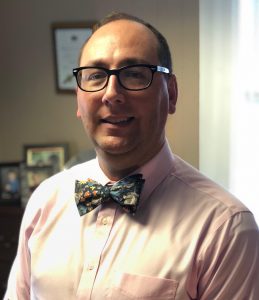From Duck Removal to COVID-19: Lessons Learned from Crisis Communications in Tuscaloosa
Published on November 5, 2020, at 5:46 p.m.
by Julianna Kendall.
Richard Rush, director of communications for the city of Tuscaloosa, Alabama, was on the job for less than five minutes of orientation before he was pulled into a meeting with the chief of police and asked for instruction on how to handle and communicate a situation. Today, his job has developed from handling day-to-day crises to a 24/7 crisis, the COVID-19 pandemic.

Rush acknowledges that he and his outstanding Incident Command team in Tuscaloosa have learned countless lessons as they have navigated the crises of 2020. Below, Rush and Scott Holmes, head of operations for Incident Command, talk about their jobs and the key takeaways that they have learned while making decisions in the war room and working for Incident Command during a pandemic. Here are lessons, applicable to any communicator who wants to work in a crisis communication role, that they have learned on the job.
#1. There is no typical day, especially during an ongoing crisis.
Rush said he is constantly putting out fires, meeting with people and solving problems for the city, but no two days mimic one another. He explained that last week he had meetings about updates on COVID-19 in the city and met with the ABC Board. He also dealt with some backlash for allowing Holidays on the River, which is winter holiday festivities such as ice skating and Santa visits, to continue, and had to figure out what to do about duck removal in a neighborhood. Ultimately, he said his days could be anything from “COVID to duck removal. It is nonstop and always something different.”
Along with the different tasks of each day, Holmes stated that there is no typical time of day that he works for Incident Command. Just this past week, he said he recorded a briefing at 7:30 a.m. and then finished that day at 6:15 p.m. However, the very next day, with flood warnings going on, he explained he started his day at 7 a.m. and would probably be at work until 3 a.m. He works 60-hour weeks but said he loves it.
#2. The public should be spoken to openly, honestly and immediately when a crisis breaks out.
Rush has three strategies when it comes to first steps of crisis communication. The first is that “no comment” is the worst comment that a communicator can give.
Secondly, he advises communicators to give the public open and honest information as fast as possible and in convenient ways for the public. He said that giving the community of Tuscaloosa as much information as possible during the early stages of COVID-19 led them to better understand why leaders were making the decisions that they were when it came to orders and public safety. Also, holding virtual town halls allowed the public to have convenient opportunities to voice their questions and concerns.
When it comes to information, he advised, “Get ahead of it. Be honest and give as much information as you possibly can and if you don’t have any information, get out there and say that you will give information when you have it. I think being open and honest early on won us a lot of points (during the beginning of the COVID-19 outbreak).”
Thirdly, he instructs communicators to give people a date and a time to avoid public panic. He explained, “If you give people a day and a time, then they just automatically calm down. It’s when people don’t know what you’re going to do, that’s when people start to panic. I would tell the mayor we are going to tell all the news outlets, ‘We are going to have a press conference this afternoon at 4 o’clock’ and then automatically people take a deep breath.”
#3. The media is a communicator’s friend and one of the best ways to get a message out.
Both Rush and Holmes agreed that COVID-19 has affected their relationships with the media in a positive way. Rush, who keeps his phone on 24/7, explained that he has gotten to the point where he can shoot a text to the media and tell them about a press conference that is happening in 30 minutes.

Even though that does not sound like a lot of time, he noted that the media still show up ready to learn what is happening and get information out to the public as soon as possible. He explained that if communicators are willing to be available to the media and are open to providing them with information when they have it, then each party benefits.
#4. Not all aspects of crisis communication are exciting, but every little part matters.
For Holmes, most of his job revolves around him being a legal adviser, researching and dictating law. He is the man responsible for legal aspects of city operations, such as executive orders and mask mandates during this pandemic, but along with his legal expertise, he is also in charge of planning and figuring out staffing for city hall.
With children being sent home from school and some people being at a higher risk for COVID-19, schedules for those working at city hall have become flexed, but work still needs to be done until 6 p.m. Holmes stated that he has had to plan in advance when people are going to miss work and organize how to get those schedules filled. For operations to continue and crises to be solved, monitoring staffing is crucial.
#5. When it comes to succeeding in crisis communication, professionals have to go above and beyond to stand out.
In crisis communication, everyone is working extremely hard 24/7. Rush explained that everyone is stressed at times and everyone works way too many hours, but learning to deal with that stress and those work hours, while also performing to the best of their ability, will set young crisis communication professionals apart.
“If you want to make it and you want to be successful,” Rush said, “then you’ve got to outwork the next person. If I have somebody on my team that is willing to try to outwork somebody else, that is more than you could ever ask for.”
Crisis communicators’ jobs move in hyper speed and involve a million different tasks, a bunch of different people and a 24/7-time range. However, for young professionals who are willing to put in the hard work, a job like being on Incident Command is worth it because each day they are truly making a difference.
Rush stated that eventually he will go back into academics, but right now he is loving being director of communications and navigating COVID-19 with the city of Tuscaloosa. When it comes to crises and his job, he elaborated that “it is a very stressful job but at the end of the day if you feel like you’re doing the best you can, you’re being honest, you’re making a difference, you’re moving the city in a positive direction, it’s kind of hard to get burnt out from that.”




